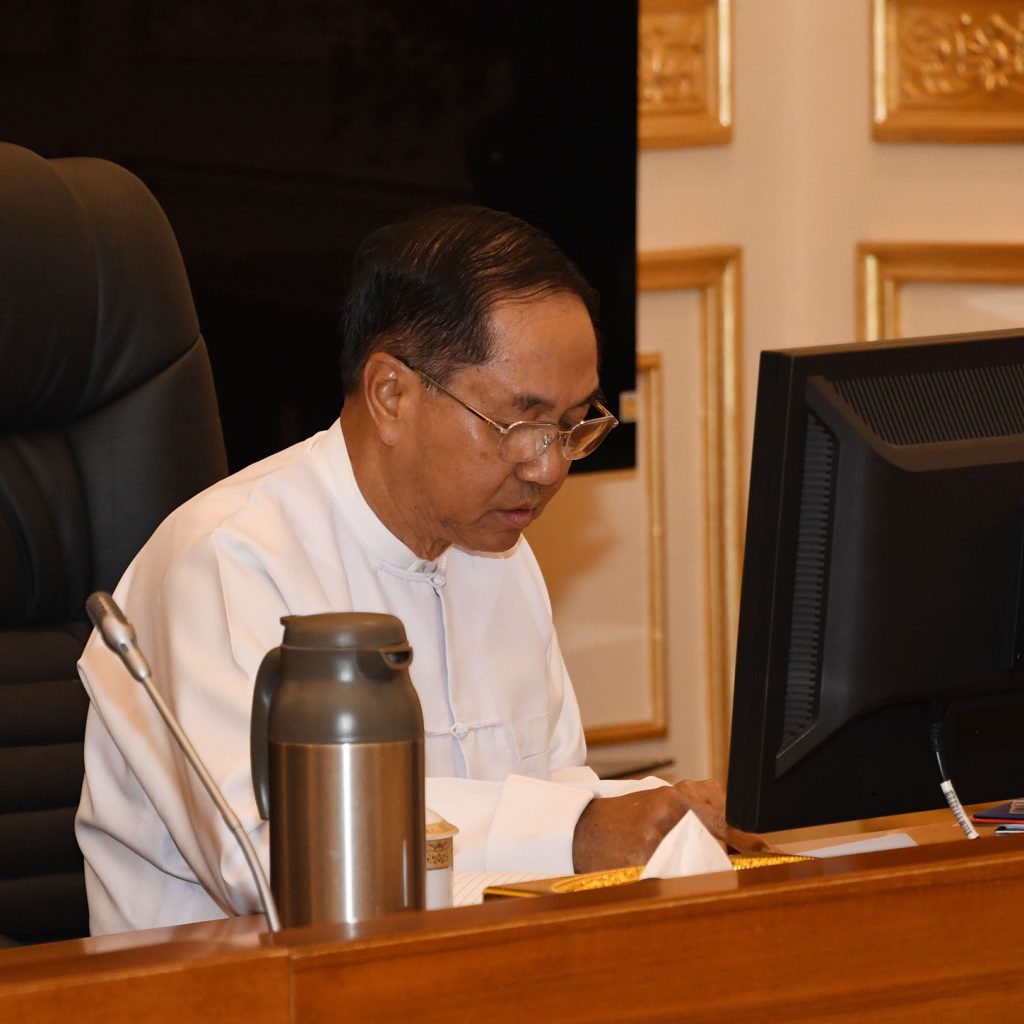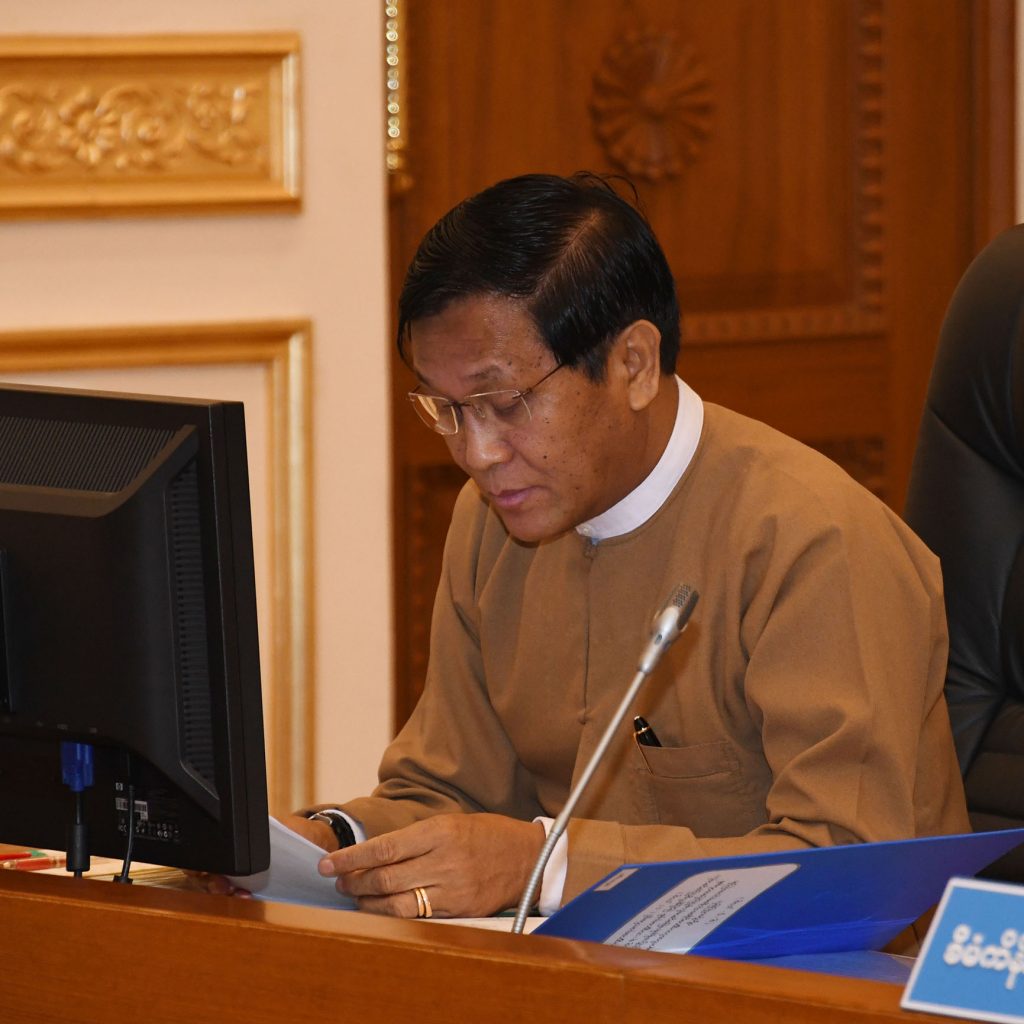10 April
President U Win Myint, Chairman of the Finance Commission, addressed the Finance Commission meeting 1/2019 held yesterday morning at the Presidential Palace.
The meeting was attended by State Counsellor Daw Aung San Suu Kyi, Finance Commission Vice-Chairmen, Vice-Presidents U Myint Swe and U Henry Van Thio, Commission Secretary Union Minister U Soe Win, Commission members the Union Attorney General, the Union Auditor General, the Nay Pyi Taw Council Chairman, and Chief Ministers from states and regions and officials.
President U Win Myint said the Finance Commission meeting 1/2019 was held for the Commission to discuss and approve fiscal year 2018-2019 supplementary budget request by Union, States and Regions governments and fiscal year 2018-2019 Union Supplementary Budget Allocation Bill. After discussion and approval, both would be sent to Pyidaungsu Hluttaw.
Additional budget allocation was a request for additional funds when the original budget allocated for expenditure was insufficient and it was not possible to transfer fund within the original budget allocation frame. The requested amount must be only for the shortfall over the original amount allocated earlier. It would be a heavy gaffe for the requesting department and organization if the funds requested were not used and returned.
Furthermore the additional budget requests could be spent only after it was approved and enacted in the Union Supplementary Budget Allocation Law so the additional budget requests should be for works originally requested and could be completed within the same period.
The Gross Domestic Product (GDP) would increase only when the country’s production, consumption, investment and trade increased. GDP Growth Rate in Myanmar for fiscal year 2018-2019 was expected to be 7.6 per cent. The economy was affected by local and foreign investments and government budget usage.
Government expenditures were the major driving force toward GDP increase. Therefore, departmental organizations need to spend on works that benefit the people than spend for spending’s sake or for show.
Additional budget request by union level departments and organizations were assessed initially by the Ministry of Planning and Finance and was further assessed by Vice President U Myint Swe. Similarly additional budget requests by states and regions were assessed by Vice President U Henry Van Thio.

Requests for supplementary budget allocation in fiscal year 2018-2019 were mainly due to deficit from exchange rate fluctuations, land compensation, salary, wages and travel allowances for staff, tax due to the Government, commercial tax and government expenditures.
Deficit from exchange rate fluctuation was for payment of principal and interest of foreign loans. Therefore, foreign currency usage must be properly managed and controlled. As foreign currency income declines, local currency rather than foreign currency must be used more while more efforts must be made towards obtaining foreign currencies.
As budget was allocated based on revenue, requests for supplementary budget were assessed and permitted if deficit was not increased, the work could be completed within the fiscal year and the work directly benefits the country and the people.
Furthermore, huge differences between actual and allocated expenditure showed the inability of the relevant department and organizations in conducting its works according to set aims.
Union level departmental organizations and state/region level departmental organizations needed to collect revenue in excess of target whenever possible and to use expenditure only where it was truly required. Expenditures should be used according to financial rules, regulations and procedures and must be expended systematically and effectively while preventing waste and misuses.
Next, Finance Commission Vice-Chairman Vice-President U Myint Swe said the supplementary budget requested for fiscal year 2018-2019 totals K 2,635 billion of which K 971 billion was for ordinary expenditure, K 467 billion was for capital expenditure, K 211 billion was for debt expenditure, K 709 billion was for investment expenditure and an additional expenditure of K 277 billion for departments and organizations conducting works outside of the Union budget with other accounts.
The supplementary budget allocation requested was found to be about 10.66 per cent of the initial amount and the increases were mainly due to increase in foreign exchange rate and raising the pension allowance of pensioners who retired before 1 April 2018 to the pension allowance rate of pensioners retiring from January 2019.
Priority were given toward special cases like supplementary budget allocation required for Rakhine State; salary, wages, awards, travel allowance and interest payments; and land and crop compensation for land and crop within projects and works conducted according to government policies.
To ensure that there were no return of unused funds and to raise the capacity in budget estimation, of the K 3,263 billion supplementary budget requested by departments and organizations, only K 2,635 billion was permitted.
Therefore, the initial expenditure of union level departments and organizations for fiscal year 2018-2019 was Ks 24,724 billion and the present supplementary budget requested amounting to Ks. 2,635 billion included Ks 39 billion for states and regions. Revised expenditure will be Ks 27,188 billion. The initial revenue was K 19,946 billion and the revised revenue will be K 21,868 billion. At the time when revisions was made GDP was K 105,726 billion and as the net deficit was Ks 5,320 billion, GDP to deficit ratio was 5.02 per cent said the Vice President.
Afterwards Finance Commission Vice-Chairman Vice-President U Henry Van Thio said supplementary budget requested by states and regions for fiscal year 2018-2019 were assessed based on the revenue collected, allocation from tax collected and initial estimates. Expenditures were assessed and reduced according to set rules and regulations on assessing and reducing supplementary budget requests.

Expenditures that can be incurred through fund transfer and fund that should be requested only at the time when the accounts were drawn up were assessed and reduced. If expenditure was not included in the initial estimate, the supplementary budget requests were assessed and reduced according to the situation. Expenditures that did not support development much were assessed and reduced.
As per the assessment of the K 224.697 billion supplementary budget requested by states and region K 103.597 billion was reduced and the supplementary budget amount became K 121.1 billion. If this was permitted the initial estimate for fiscal year 2018-2019 was K 1,793.645 billion and the revised estimate will be K 1,832.64 billion resulting in an addition union funding support of K 38.995 billion.
The Vice President requested the Commission to review and approve the K 121.1 billion assessed fiscal year 2018-2019 supplementary budget allocation for states and regions and the revised union funding support of K 38.995 billion.
Financial Commission secretary Union Minister for Planning and Finance U Soe Win then explained about fiscal year 2018-2019 union supplementary budget, revised budget and the Union Supplementary Budget Allocation Bill while Financial Commission members Nay Pyi Taw Council Chairman, state and region chief ministers discussed in support of the bill. In delivering his concluding speech the President said the union government, state and regional governments were required to use the supplementary budget precisely according to laws, rules, financial regulations and procedures and must be audited systematically by internal audits and the Office of the Union Auditor General.
Calling tenders for construction and procurement works were to be conducted quickly during the fiscal year and delays or not calling for tenders would results in unused and excess funds. Furthermore the supplementary budget permitted was to be used within a three to four months period and if a supplementary budget was requested for works that could not be completed in that time frame would result in unused and excess fund. If the supplementary budget was not used or was used without benefiting the people it would mean the respective department or organization lacks capacity or had erred in its work.
He said in the New Year speech delivered last year, the habit of not using the budget was told to be changed. Project expenditures were to be estimated to the nearest actual amount and calculated reflecting the prices and rates of the region and time. The capacity to evaluate huge projects and producing progress reports were to be raised and developed. Severe action will be taken against those who invite tenders that are not in conformity with the rules and regulations, and those who take advantage of loopholes in the tender system for their own benefit, said the President. This warning was given again so tender rules and processes should be followed accurately.
Works need to be done by the Union Government toward controlling the deficit amount and the difference between initial and revised GDP to deficit ratio. The budget was to be estimated as accurately as possible and it would best if there were no requests for supplementary budget allocations. — MNA (Translated by Zaw Min)


